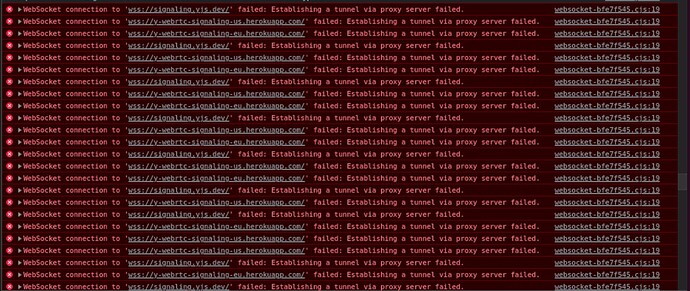With this code:
import { WebrtcProvider } from 'y-webrtc'
import * as Y from "yjs";
const [sharedType, provider] = useMemo(() => {
const doc = new Y.Doc();
const sharedType = doc.getArray<SyncElement>("content");
const provider = new WebrtcProvider('ws://localhost:5555', doc)
return [sharedType, provider];
}, [id]);
const editor = useMemo(() => {
const editor = withCursor(
withYjs(withLinks(withReact(withHistory(createEditor()))), sharedType),
provider.awareness
);
return editor;
}, [sharedType, provider]);
useEffect(() => {
provider.on("status", ({ status }: { status: string }) => {
setOnlineState(status === "connected");
});
provider.awareness.setLocalState({
alphaColor: color.slice(0, -2) + "0.2)",
color,
name,
});
provider.on("sync", (isSynced: boolean) => {
if (isSynced && sharedType.length === 0) {
toSharedType(sharedType, [
{ type: "paragraph", children: [{ text: "Hello world!" }] },
]);
}
});
provider.connect();
return () => {
provider.disconnect();
};
}, [provider]);
I get these error messages :
Why and how is herokuapp involved if the server executed is the following one :
node y-webrtc-server.js
Signaling server running on localhost: 5555
y-webrtc-server.js :
#!/usr/bin/env node
import ws from 'ws'
import http from 'http'
import * as map from 'lib0/map'
const wsReadyStateConnecting = 0
const wsReadyStateOpen = 1
const wsReadyStateClosing = 2 // eslint-disable-line
const wsReadyStateClosed = 3 // eslint-disable-line
const pingTimeout = 30000
const port = process.env.PORT || 5555
// @ts-ignore
const wss = new ws.Server({ noServer: true })
const server = http.createServer((request, response) => {
response.writeHead(200, { 'Content-Type': 'text/plain' })
response.end('okay')
})
/**
* Map froms topic-name to set of subscribed clients.
* @type {Map<string, Set<any>>}
*/
const topics = new Map()
/**
* @param {any} conn
* @param {object} message
*/
const send = (conn, message) => {
if (conn.readyState !== wsReadyStateConnecting && conn.readyState !== wsReadyStateOpen) {
conn.close()
}
try {
conn.send(JSON.stringify(message))
} catch (e) {
conn.close()
}
}
/**
* Setup a new client
* @param {any} conn
*/
const onconnection = conn => {
/**
* @type {Set<string>}
*/
const subscribedTopics = new Set()
let closed = false
// Check if connection is still alive
let pongReceived = true
const pingInterval = setInterval(() => {
if (!pongReceived) {
conn.close()
clearInterval(pingInterval)
} else {
pongReceived = false
try {
conn.ping()
} catch (e) {
conn.close()
}
}
}, pingTimeout)
conn.on('pong', () => {
pongReceived = true
})
conn.on('close', () => {
subscribedTopics.forEach(topicName => {
const subs = topics.get(topicName) || new Set()
subs.delete(conn)
if (subs.size === 0) {
topics.delete(topicName)
}
})
subscribedTopics.clear()
closed = true
})
conn.on('message', /** @param {object} message */ message => {
if (typeof message === 'string') {
message = JSON.parse(message)
}
if (message && message.type && !closed) {
switch (message.type) {
case 'subscribe':
/** @type {Array<string>} */ (message.topics || []).forEach(topicName => {
if (typeof topicName === 'string') {
// add conn to topic
const topic = map.setIfUndefined(topics, topicName, () => new Set())
topic.add(conn)
// add topic to conn
subscribedTopics.add(topicName)
}
})
break
case 'unsubscribe':
/** @type {Array<string>} */ (message.topics || []).forEach(topicName => {
const subs = topics.get(topicName)
if (subs) {
subs.delete(conn)
}
})
break
case 'publish':
if (message.topic) {
const receivers = topics.get(message.topic)
if (receivers) {
receivers.forEach(receiver =>
send(receiver, message)
)
}
}
break
case 'ping':
send(conn, { type: 'pong' })
}
}
})
}
wss.on('connection', onconnection)
server.on('upgrade', (request, socket, head) => {
// You may check auth of request here..
/**
* @param {any} ws
*/
const handleAuth = ws => {
wss.emit('connection', ws, request)
}
wss.handleUpgrade(request, socket, head, handleAuth)
})
server.listen(port)
console.log('Signaling server running on localhost:', port)
I actually found that in /node_modules/y-webrtc/src$y-webrtc.js the heroku signaling server is hard-wired within the WebRTCProvider class :
xport class WebrtcProvider extends Observable {
/**
* @param {string} roomName
* @param {Y.Doc} doc
* @param {Object} [opts]
* @param {Array} [opts.signaling]
* @param {string?} [opts.password]
* @param {awarenessProtocol.Awareness} [opts.awareness]
* @param {number} [opts.maxConns]
* @param {boolean} [opts.filterBcConns]
* @param {any} [opts.peerOpts]
*/
constructor (
roomName,
doc,
{
signaling = [‘wss://signaling.yjs.dev’, ‘wss://y-webrtc-signaling-eu.herokuapp.com’, ‘wss://y-webrtc-signaling-us.herokuapp.com’],
But… how to modify it? I shouldn’t touch this repo…
And in client.js I’ve already specified:
const provider = new WebrtcProvider('ws://localhost:5555', doc)
How to solve the problem?

 . Looks like you’re trying to run the client-side via NodeJS. As far as I know, that’s not going to work. In my client code (I use
. Looks like you’re trying to run the client-side via NodeJS. As far as I know, that’s not going to work. In my client code (I use